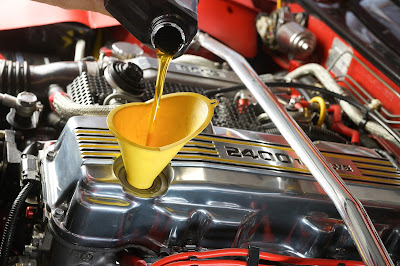Keeping your car in top working order requires regular maintenance. No maintenance is more common than an oil change.
Why Get Have Your Car Serviced
The main reason for an oil change is to help keep the engine running smooth. The liquid acts as a lubricant on the entire engine's moving parts. As the lubricant gets used, contaminants build up inside the liquid. This sludge makes it more difficult for parts of the engine to move freely. As this occurs, you may feel that your car is not running properly. The engine may start cutting out or stop working completely due to overheating. If the parts have to work harder to move, the engine is going to heat up even more.
Conventional vs Synthetic
There are a couple of different types that can be used in your engine. You can choose what is known as conventional, and it is usually the cheapest. This version will help reduce the build-up of contaminants in the engine itself, as well as reduce friction on parts. It is created through a distillation of crude oil. Before you decide on a type, you should make sure that you check your car's owner's manual to make sure the right weight and version is used.
The Process
An oil change is a simple process. The technician gets under the car, removes the pan (on some models) and plug, and allows the liquid to drain from the car. Once it is empty, he or she reinstalls the plug and pan (if applicable), and then refills the engine with fresh, clean lubricant. In addition, the filter should be changed in order to keep your car running smoothly. The filter helps collect some of that sludge and keep the substance cleaner longer.
While many people choose to do this task themselves, by going to a professional, you are certain that all seals are tight and that the proper type is used. This is the benefit of not having to dispose of the old substance yourself.
There is a lot of debate on how often to have an oil change. Lube shops and most manufacturers suggest every 3,000 miles or every 3 months. Some professionals suggest every 5,000 miles with no minimum length of time. If you read the label on some synthetic bottles, they suggest every 10,000 miles. If you are uncertain, have your oil changed every 3,000 to 5,000 for best performance results.
Always check your levels between oil changes. This will not only indicate how dirty the system is getting, as the easier it is to read the dirtier it is, but doing so will also inform you of leaks. You should not lose much of the overall lube in between services. If you have to refill your engine before your next change, then there is a leak somewhere, and you need to have it checked.
Why Get Have Your Car Serviced
The main reason for an oil change is to help keep the engine running smooth. The liquid acts as a lubricant on the entire engine's moving parts. As the lubricant gets used, contaminants build up inside the liquid. This sludge makes it more difficult for parts of the engine to move freely. As this occurs, you may feel that your car is not running properly. The engine may start cutting out or stop working completely due to overheating. If the parts have to work harder to move, the engine is going to heat up even more.
Conventional vs Synthetic
There are a couple of different types that can be used in your engine. You can choose what is known as conventional, and it is usually the cheapest. This version will help reduce the build-up of contaminants in the engine itself, as well as reduce friction on parts. It is created through a distillation of crude oil. Before you decide on a type, you should make sure that you check your car's owner's manual to make sure the right weight and version is used.
The Process
An oil change is a simple process. The technician gets under the car, removes the pan (on some models) and plug, and allows the liquid to drain from the car. Once it is empty, he or she reinstalls the plug and pan (if applicable), and then refills the engine with fresh, clean lubricant. In addition, the filter should be changed in order to keep your car running smoothly. The filter helps collect some of that sludge and keep the substance cleaner longer.
While many people choose to do this task themselves, by going to a professional, you are certain that all seals are tight and that the proper type is used. This is the benefit of not having to dispose of the old substance yourself.
There is a lot of debate on how often to have an oil change. Lube shops and most manufacturers suggest every 3,000 miles or every 3 months. Some professionals suggest every 5,000 miles with no minimum length of time. If you read the label on some synthetic bottles, they suggest every 10,000 miles. If you are uncertain, have your oil changed every 3,000 to 5,000 for best performance results.
Always check your levels between oil changes. This will not only indicate how dirty the system is getting, as the easier it is to read the dirtier it is, but doing so will also inform you of leaks. You should not lose much of the overall lube in between services. If you have to refill your engine before your next change, then there is a leak somewhere, and you need to have it checked.
To learn more about their options for an oil change, New Jersey residents should visit http://etddiscounttire.com/oil-change-service-new-jersey.

